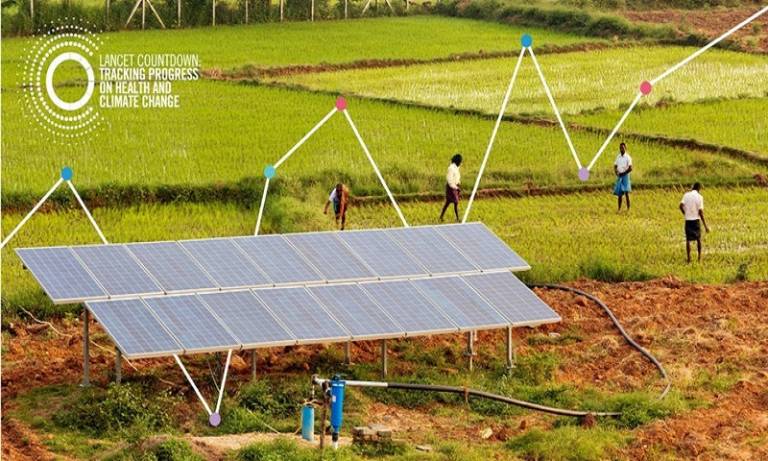Climate change already damaging health of millions globally
1 November 2017
UCL ISR and UCL-Energy researchers have contributed to a report showing that climate change is already a significant public health issue and a looming global health emergency.

New research shows that climate change is already a significant public health issue and a looming global health emergency. Its findings, outlined in The Lancet medical journal, demonstrate the various ways climate change is already affecting the health of people across the planet, today.
The report was produced by the Lancet Countdown: Tracking Progress on Health and Climate Change, which UCL leads. UCL ISR and UCL-Energy authors include: Paul Drummond, Paul Ekins, Ian Hamilton, Melissa Lott, Robert Lowe, Tadj Oreszczyn and Steve Pye. Paul Drummond and Paul Ekins from UCL ISR lead the ‘Economics and Finance’ indicator set – one of five indicator sets that comprise the Countdown.
The Lancet Countdown involves leading doctors, academics and policy professionals who have contributed analysis and jointly authored the report. Aside from UCL, partners behind the research include the World Bank and the World Health Organization.
Some of the existing health impacts documented by the report include:
- An average 5.3% fall in productivity for rural labour estimated globally since 2000, as a result of rising temperatures. In 2016 this effectively took more than 920,000 people globally out of the workforce, with 418,000 of them in India alone.
- Between 2000 and 2016, the number of people exposed to heatwave events has increased by approximately 125 million, with a record 175 million people exposed to heatwaves in 2015. This supports The Lancet’s existing research showing just under 1 billion additional heatwave exposure events happening by 2050.
- Undernutrition is identified as the largest health impact of climate change in the 21st century. Related impacts of climate change on crop production referenced in the report include a 6% decline in global wheat yields and 10% fall in rice yields for each additional 1 °C rise in global temperature.
- Over 803,000 premature and avoidable deaths in 2015 as a result of air pollution across 21 Asian countries, attributable to just one type of air pollution from coal power, transport and use of fossil fuels in the home.
- A striking increase of 3% and 5.9% in the vectorial capacity for the transmission of Dengue due to climate trends, by just two types of mosquito since 1990. With 50 to 100 million infections of Dengue estimated to occur each year, this will exacerbate the spread of the world’s most rapidly expanding disease.
The initiative builds on the work of the 2015 Lancet Commission on Health and Climate Change, which concluded that anthropogenic climate change threatens to undermine the last 50 years of gains in public health. Today’s research shows this is becoming increasingly clear and the challenges are greater than anticipated. The findings also show that climate change is affecting the health of all populations today. These impacts are disproportionately felt by communities least responsible for climate change and those who are the most vulnerable in society.
However, the authors are also clear that responding to climate change still provides an opportunity to realise substantial gains in public health. The potential benefits include cleaning up the air of polluted cities, delivering more nutritious diets, ensuring energy, food and water security, and alleviating poverty, alongside social and economic inequalities.
Links
Media Coverage
About the Lancet Countdown: Tracking Progress on Health and Climate Change
The Lancet Countdown: Tracking Progress on Health and Climate Change (Lancet Countdown) is an international research collaboration, dedicated to tracking the world's response to climate change, and the health benefits that emerge from this transition. Reporting annually in The Lancet, its goal is to support an accelerated and adequate response to climate change, by informing the work of policymakers in health and other sectors, while also engaging the health profession in responding to the challenge.
The indicators included in the report will evolve over time in response to feedback and data improvements. The Lancet Countdown is funded by the Wellcome Trust and supported by The Lancet, working in special collaboration with the World Health Organization, World Meteorological Organization as its UN partners.
For more information on the Lancet Countdown see: www.lancetcountdown.org
 Close
Close

